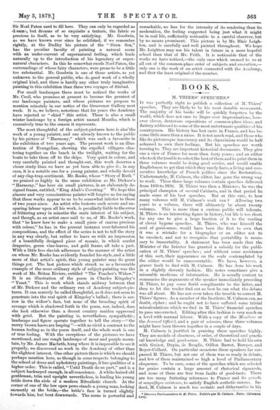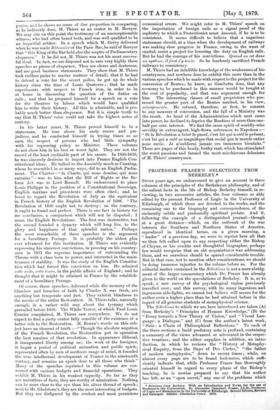. BOOKS.
M. TRIERS' SPEECHES.*
Ir was perfectly right to publish a collection of M. Thiers' speeches. They are likely to be his most durable monument. The majority of his books will be quickly forgotten by the world, which does not care to linger over improvisations, how- ever clever, dexterous expositions of common-place ideas, and flattery addressed to some of the most unfortunate qualities of his countrymen. His history has lost caste in France, and has be- come little more than a name. It is not much read, and those who like its picturesque inaccuracy and its chauvinism would be half ashamed to own their feelings. But his speeches are worth turning to. They are important historical documents. They give one a view of France for more than forty years ; and an editor who took the trouble to select the best of them and to print them in three volumes would be doing good service, and would enable Englishmen to get that which they rarely have, a living and con- secutive knowledge of French politics since the Restoration. Unfortunately, M. Calmon, the editor, has gone the wrong way to work. These three large volumes contain speeches delivered from 1830 to 1836. M. Thiers was then a Minister ; he was the principal champion of several Cabinets, and in that period he made some of his best speeches. But at this rate, to how many volumes will M. Calmon's work run ? Allowing two years to a volume, there will ultimately be about twenty volumes. This is more than a curious public will tolerate. M. Thiers is an interesting figure in history, but life is too short for any one to give a large fraction of it to the reading of clever bygone speeches. M. Thiers, who was himself the soul of good-sense, would have been the first to own that it was a mistake for a biographer or an editor not to be succinct, and not to recognise that portability is neces- sary to immortality. A statement has been made that the Minister of the Interior has granted a subsidy for the publi- cation of M. Thiers' speeches ; and without some assistance of this sort, their appearance on the scale contemplated by the editor would be unaccountable. We have, however, a graver fault to find with M. Calmon. He has done his work in a slightly slovenly fashion. His notes sometimes give a miserable modicum of information. He is usually content to summarise the arguments of the speaker immediately preceding M. Thiers, to pay some florid compliments to the latter, and then to let the reader find out as best he can what the debate was all about. He has not even taken the trouble to correct M. Thiers' figures. As a member of the Institute, M. Calmon can, no doubt, cipher ; and he ought not to have suffered some trivial miscalculations which we find in M. Thiers' financial speeches to pass uncorrected. Editing after this fashion is very much on a level with manual labour. With a copy of the Moniteur or the Journal Offieicl, and a pair of scissors, these three volumes might have been thrown together in a couple of days.
M. Calmon is justified in praising these speeches highly. They are models of clearness, of order, of theoretical and practi- cal knowledge and good-sense. M. Thiers had to hold his own with Guizot, Dupin, de Broglie, Odilon Barrot, Berryer, and Royer-Collard. On particular occasions these speakers far sur- passed M. Thiers, but not one of them was so ready in debate, and few of them maintained so high a level of Parliamentary eloquence. To be sure, some of the speeches which are selected for praise contain a large amount of rhetorical rigmarole, and none of them are free from faults of good-taste. There are too many flattering references to France and its gran de at magnifique existence, to satisfy English esthetic canons. In- deed, M. Calmon is much too ecstatic and dithyrambic in his * &scours Partemadaires de M. Thiers. Public's par M. Colman. Paris : Oalaman Ldvy.
praise, and he shows no sense of due proportion in comparing, as he indirectly does, M. Thiers as an orator to M. Berryer. We may cite on this point the testimony of an unexceptionable -witness, who had often heard both, and was well qualified to be an impartial arbiter. In a speech which M. Gravy delivered when he was made Beitonnier of the Paris Bar, he said of Berryer that " this King of the Bar held also the sceptre of Parliamentary eloquence." If he did not, M. Thiers was not his most success- ful rival. In fact, we are disposed not to rate very highly these speeches as pieces of eloquence.. They are clever and dexterous, and are good business statements. They show that M. Thiers took endless pains to master matters of detail ; that if he had to defend a vote for the secret police, he got up its whole history since the time of Louis Quatorze ; , that he made experiments with respect to French iron, in order to be at home in discussing the question of the duties on rails ; and that he prepared himself for a speech on a vote for the theatres by labour which would have qualified him to write their history. All this is admirable, and is pro- bably much better than eloquence. But it is simple truth to say that M. Thiers' voice could not take the highest notes of oratory.
In his latter years, M. Thiers proved himself to be a statesman. He rose above his early errors and pre- judices, and he conducted himself in trying times so as earn the respect of persons who had little sympathy with his vaponring policy as Minister. These volumes do not show him in his best or worst light. They are not the record of the least creditable part of his career. In 1830-1836, he was sincerely desirous to import into France English Con- stitutional ideas. He talked to the Assembly much as Canning, whom he resembled in so many ways, did to an English Parlia- went. The Charter—" la Chaste, qui nous domine, qui nous entrain "—was to him what the Bill of Rights or the Re- form Act was to Lord Russell. He endeavoured to place Louis Philippe in the position of a Constitutional Sovereign. English maxims and precedents were often cited ; and he loved to regard the Revolution of July as the equivalent in French history of the English Revolution of 1688. " The Revolution of 1830 ought not to destroy; on the contrary, it ought to found and perfect. There is one fact in history for me conclusive, a comparison which will not be disputed ; I mean the English Revolutions. The first was destructive, but the second founded a dynasty which will long live, to the glory and happiness of that splendid nation." Perhaps the most remarkable of these speeches is the argument for a hereditary Peerage. It is probably the ablest plea ever advanced for this institution. M. Thiers was evidently expressing his sincerest convictions, in pressing on his country- men in 1831 the supreme importance of surrounding the Throne with a class born to power, and interested in the main- tenance of stability. It was the study of the English Constitu- tion which had forced this conviction on him. He admired cette snite, cells tenue, in the public affairs of England ; and he thought that it might be attained in France by the establish- ment of a hereditary Peerage.
Of course, these speeches, delivered while the memory of the blunders and breaches of faith by Charles X. was fresh, are anything but temperate and just. They exhibit blindness to the merits of the entire Restoration. M. Thiers talks, naturally enough, in a rather wild way about the tyranny which prevailed before 1830. The White Terror, of which Paul Louis Courier complained, M. Thiers saw everywhere. We do not expect to find a party orator fully sensible of the existence of a better side to the Restoration. M. Renan's words on this sub- ject have an element of truth :—"Though the absolute negation of the French Revolution, the Restoration put in operation the best maxims of that revolution. In appearance illiberal, it inaugurated liberty among us; the work of the foreigner, it began a period of political animation and public spirit; represented often by men of mediocre range of mind, it founded the true intellectual development of France in the nineteenth century, and remains an epoch dear to all those who think." Many of the speeches reprinted in this volume are con- cerned with various budgets and financial operations. They exhibit M. Thiers in his weakest capacity. So far as they are narratives of facts, they are worthy of admiration. Nothing can be more clear to the eye than his silver thread of speech ; next to Mr. Gladstone's, they are the most interesting of budgets. But they are disfigured by the crudest and most pernicious
economical errors. We might refer to M. Thiers' speech on the importation of foreign rails as a signal proof • of the sophistry to which a Protectionist must descend, if he is to be consistent. It seems difficult to believe that a sagacious statesman should, at a time when the development of railways was making slow progress in France, owing to the want of capital, resist a project for lowering the duty on English rails. But he had the courage of his convictions. Quand on est dans nn ey8tcme, it faut s'y tenir. So he fearlessly sacrificed French railways to consistency.
M. Thiers had an infallible knowledge of the weaknesses of his countrymen, and nowhere does he exhibit this more than in the various speeches which he made with respect to the project for the conversion of Rentes ; he knew, as Gambetta does, that any economy to be purchased in this manner would be bought at the cost of popularity, and that was argument enough for him. The interesting classes of small proprietors who pos- sessed the greater part of the Rentes merited, in his view, minagenieuts. He refused, therefore, at first, to consent to any measure of conversion, and the fall of a Ministry was the result. As head of the Administration which next came into power, he declined to deprive the Rentiers of more than one- half per cent. interest. We find the same spirit of worldly-wise servility in extravagant, high-flown references to Napoleon :— " Si la Revolution a brise le passé, c'est lui qui a tree le present, c'est lui qui a tree ce magnifique &at social que le monde entier nous envie. Je n'oublierai jamais ces immenses bienfaits." There are pages of this heady, frothy rant, which has stimulated the worst passions and fanned the most mischievous delusions of M. Thiers' countrymen.



































 Previous page
Previous page